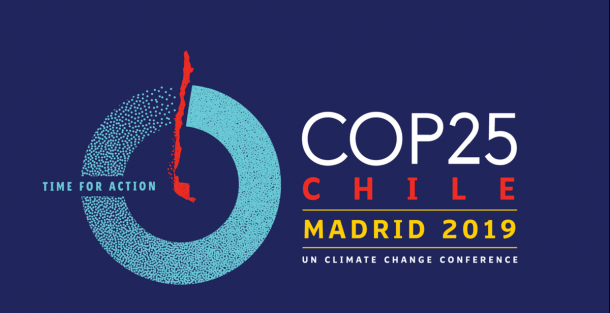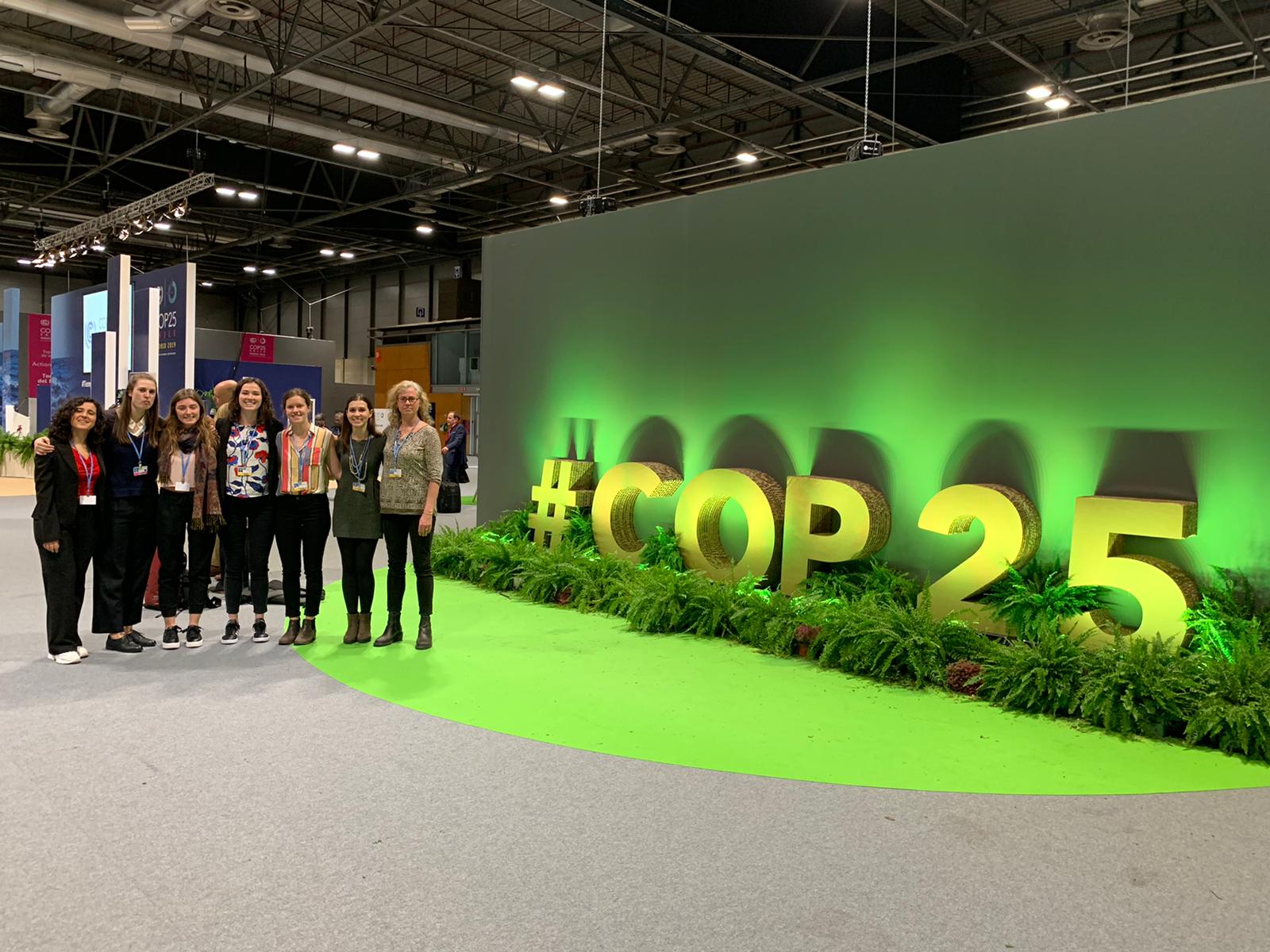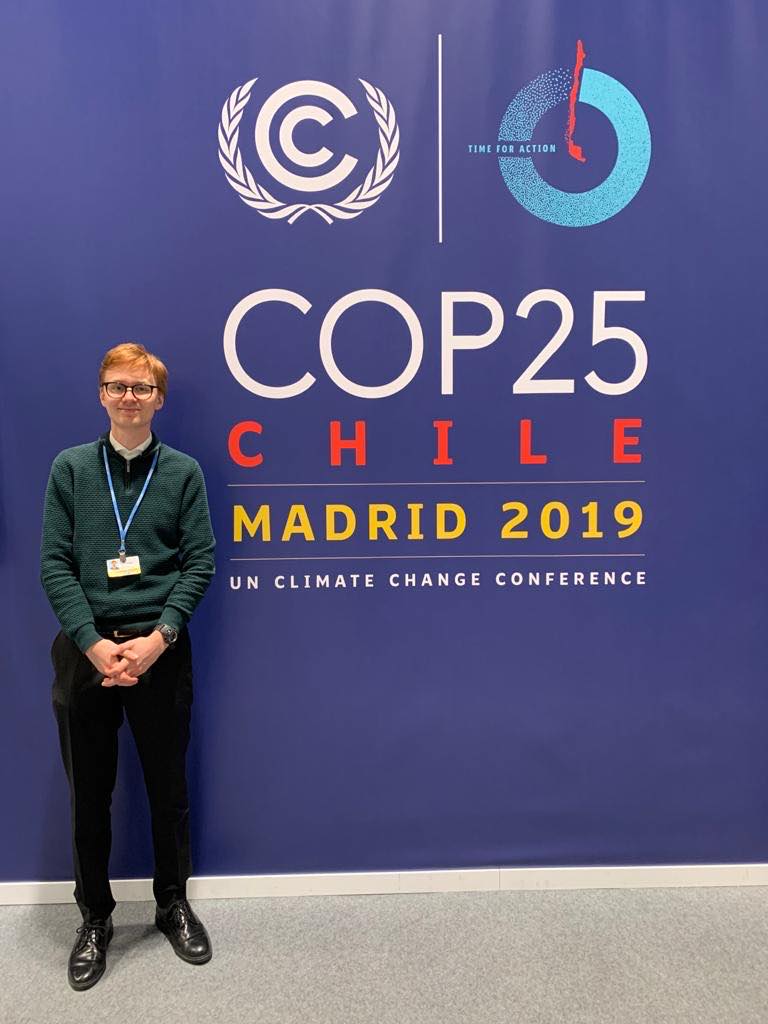Home / Initiatives / United Nations Climate Conference
United Nations Climate Conference
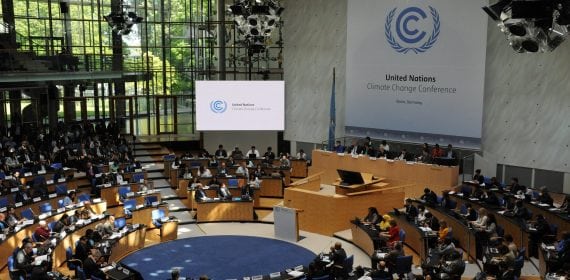
Each year, Tufts Institute of the Environment (TIE) sends delegates to represent Tufts University at the United Nations Framework Convention on Climate Change (UNFCCC) annual Conference of the Parties (COP) . Through their status as observers, the Tufts delegates gain important insight into the discussions that frame global climate change policy and action. Attending this event has long impacted faculty and student research and continues to shape Tufts' sustainability policy.
ALL members of the Tufts community, including undergraduate students, graduate students, faculty, staff and alumni, are eligible to apply to attend COP. In addition to attending the vital discussions of the event, the Tufts delegates can participate in several activities, such as exhibits, side events, and a daily newsroom that provides regular, on-going communication and updates on COP decisions. Whilst at the conference, and upon their return, delegates in turn share the outcomes of this once-in-a-lifetime experience with the wider Tufts community.
First round applications to be a Tufts delegate for COP26 are now closed.
COP26: 31 October - 12 November 2021 Glasgow, Scotland, UK
The United Nations Climate Change Secretariat announced that the annual COP26 meeting scheduled for November, 2020 has been postponed until 2021 as a result of the COVID-19 pandemic. The new dates for the COP are now set for 31 October to 12 November 2021. Please stay abreast of UN communications in case any additional changes are made.
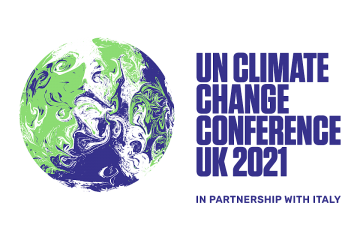 For more information about the event, please visit: https://www.ukcop26.org/
For more information about the event, please visit: https://www.ukcop26.org/
Tufts Selection Process & General Information
Delegation Selection

Because ALL Tufts members are eligible to attend this event, TIE often receives more first round applications than the quotas (i.e. number of delegate badges) that are allocated to Tufts by the UNFCCC. When this happens, a second round of applications is triggered and an interdisciplinary selection committee of Tufts faculty and staff is convened to review these applications. The selection committee will consider: (i) professional and academic background, (ii) interest in the event, (iii) plan to secure funding, and (iv) expected contribution to Tufts’ participation at the event and upon return to the Tufts community. Preference is given to students who have not attended a COP event previously as a Tufts Observer and who are in the last year of their studies. Additionally, interdisciplinary diversity will be considered in convening the delegation.
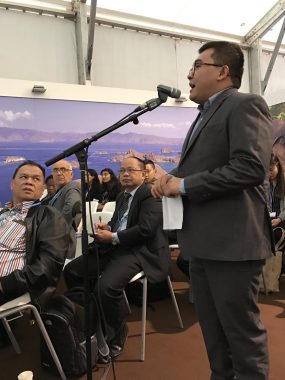
Event Logistics
In order to maximize the number of participants that can be sent to COP as Tufts Observers, the quotas allocated to Tufts are typically divided between the first and second weeks of this two-week conference. During the second round of the selection process, applicants will be asked to choose which week they would like to attend (Week 1 or Week 2).
For some past events, the UNFCCC has divided COP into two "zones": one zone that includes the plenary halls and meeting rooms designated specifically for the negotiations, and another zone to accommodate climate action events including side events, exhibits, media activities and country pavilions. Each year the UNFCCC announces whether COP will be organized into one or more zones, but please be aware that Tufts may receive varying quotas for each zone.
Funding
All attendees are expected to secure funding for their own, individual, travel needs (i.e. airfare, lodging, meals, etc.). During the second round of the selection process, applicants will be asked if they have secured funding or not. Please visit TIE's "Funding" page here to browse funding resources available at Tufts.
Timeline
Please note that due to the on-going Covid-19 situation, the below timeline may change subject to United Nations alterations in the application process and conference timeline. We will be sure to update this page with the most current information as it becomes available.
- Spring 2021: Once the COP location and dates have been announced, TIE solicits initial interest from Tufts members with a simple, first round application.
- June - July 2021: Once TIE receives the UNFCCC's quota(s) for the Tufts delegation, TIE will compare initial applications with the number of badges made available by the quota(s) to determine if a selection committee must be convened.
- July - August 2021: If necessary, TIE will initiate the second round of applications, and applications will be sent to the selection committee for selection of the delegates.
- August - September 2021: Applicants will be notified of their selection. Delegates will confirm their attendance by providing proof of travel. TIE will confirm all Tufts delegates in the UNFCCC's registration system. TIE will also coordinate pre-departure briefings for the Tufts delegates.
- October 31 - November 12, 2021 : COP26! TIE will host a de-briefing and dissemination session upon the Tufts delegation's return in order for the delegates to reflect on and share their valuable experiences with the wider Tufts community.
Highlights from COP-25!
The 25th Conference of the Parties (COP25) was held in Madrid, Spain from 2 - 13 December under the presidency of the Chilean government . Twelve (12) Tufts students, faculty, staff and alumni represented Tufts at this event.
Tufts Delegates Reflect on COP
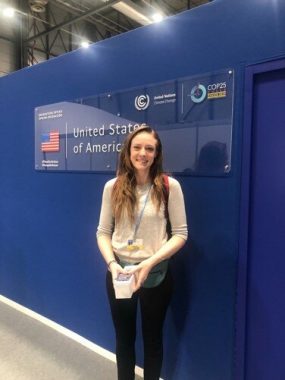
"Catching glimpses of the world of negotiators as they slog through language, debating down to the bracket, attempting to slide “as applicable” in to the end of every sub-clause, is unique. Next year, 2020, is looming on the horizon with large commitment deadlines and the year of the ocean laying out an agenda of breathtaking proportions: but we cannot miss what has happened around us"
Carolyn House,
Graduate Student, Fletcher, Human Security and International Natural Resource Management
Tufts at COP25: Madrid, Spain
As We Cross the River
Tufts University faculty member, Kate Risse, evokes the painting, Landscape with Charon Crossing Styx by Joachim Patinier, when speaking about COP25. Kate describes the division between big polluters being shown the more sustainable path by local NGOs, youth activists, local governments, etc., just as the angel shows the human soul crossing the Styx, but continue to keep their backs turned. Read more here.
COP25 and a Commitment to a Sustainable Fashion Industry
Tufts University student Madeline Weir discusses the continuation of the Fashion Industry Charter for Climate Action at COP25 and the need for action that is in line with the 1.5 degree scenario for the entire industry and a need to confront systemic conditions that are barriers to this goal. Madeline attended a two-hour panel and Q&A session with panelists who are working to lessen the fashion industry’s impact on climate change with their goal to reduce overall emissions of the industry by 30% for the overall supply chain by 2030. Read more here.
Youth Activism, Climate Grief, and Policy Stagnation at COP25
Fletcher School MALD student Bethany Tietjen discusses youth activists’ presence at COP25 and how “climate grief” can affect those striving for meaningful change and impact. Bethany also describes attending the #behindthescience panel where activists, Greta Thunberg and Luisa Neubauer accompanied scientists such as CIERP founder, Bill Moomaw, in promoting intergenerational collaboration in combating climate change. . Read more here.
Ratcheting Down Paris Targets
Fletcher School pre-doctoral fellow, Rishikesh Bhandary, discusses the negotiations on carbon markets and how they ultimately broke down at COP25. Although these negotiations did not lead to concrete policy, Rishi explains that this should not be seen as a vote of confidence against the Paris Agreement, and that next year may prove to be more fruitful. Read more here.
A Call for Urgency
Tufts University SMFA alum Lucia Ravens discusses the call for urgency that was present at COP25. Whether it be in the negotiations or from the activists attending the COP, there was a sense of necessity when it came to combating carbon emissions and the use of green house gases. Read more here.
